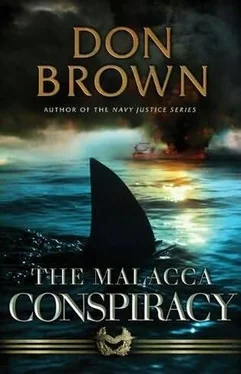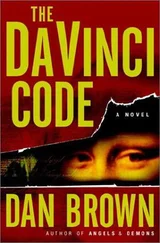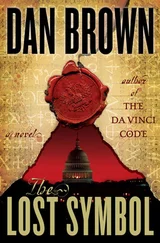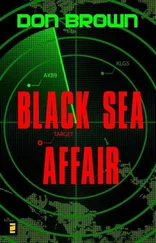Don Brown - The Malacca Conspiracy
Здесь есть возможность читать онлайн «Don Brown - The Malacca Conspiracy» весь текст электронной книги совершенно бесплатно (целиком полную версию без сокращений). В некоторых случаях можно слушать аудио, скачать через торрент в формате fb2 и присутствует краткое содержание. Жанр: Триллер, на английском языке. Описание произведения, (предисловие) а так же отзывы посетителей доступны на портале библиотеки ЛибКат.
- Название:The Malacca Conspiracy
- Автор:
- Жанр:
- Год:неизвестен
- ISBN:нет данных
- Рейтинг книги:5 / 5. Голосов: 1
-
Избранное:Добавить в избранное
- Отзывы:
-
Ваша оценка:
- 100
- 1
- 2
- 3
- 4
- 5
The Malacca Conspiracy: краткое содержание, описание и аннотация
Предлагаем к чтению аннотацию, описание, краткое содержание или предисловие (зависит от того, что написал сам автор книги «The Malacca Conspiracy»). Если вы не нашли необходимую информацию о книге — напишите в комментариях, мы постараемся отыскать её.
The Malacca Conspiracy — читать онлайн бесплатно полную книгу (весь текст) целиком
Ниже представлен текст книги, разбитый по страницам. Система сохранения места последней прочитанной страницы, позволяет с удобством читать онлайн бесплатно книгу «The Malacca Conspiracy», без необходимости каждый раз заново искать на чём Вы остановились. Поставьте закладку, и сможете в любой момент перейти на страницу, на которой закончили чтение.
Интервал:
Закладка:
The ambassador answered, “Well, Commander, that’s 561 miles by the flight of the crow, or more to the point, by the flight of the C-130.”
Zack released her hand, but not his smile. “So when do you start your new job?”
“In about fifteen minutes. We just got word of an attempted attack against the tanker SeaRiver Baytown. USS Reuben James took out the suicide boat, and they found at least two Indonesians on board. Reuben James is bringing the bodies into port here in Singapore. I’m going down to meet the ship.”
His smile vanished. “I’m going with you.”
“Later, Commander,” the ambassador said. “I’ll make sure Commander Colcernian apprises you of everything.”
“Aye, sir.” His voice deflated.
Diane leaned over and kissed him on the forehead. “See ya soon, Zack.”
Changi Naval Base
Singapore
2:45 p.m.
The new Changi Naval Base, home port of the Singaporean navy, was a panoramic splash of red-and-white, as the stars and crescent moon that graced the red-and-white, broad-striped flag of the tiny republic fluttered from every ship moored in the piers, from every building facing the piers, and from flagpoles on the piers themselves.
There was one exception.
The 450-foot gray warship, which only minutes ago inched slowly alongside Pier One, flew off her fantail the red, white, and blue of the Stars and Stripes of the United States of America.
At the end of Pier One, Lieutenant Commander Diane Colcernian, in the summer white uniform of a US Navy JAG officer, stood next to a Singaporean naval officer and watched as Singaporean sailors standing on the pier tossed lines back and forth with sailors on the American warship.
Moments later, the ship’s crewmen erected a portable catwalk between the ship and the pier, then unfolded a white-and-blue banner. The banner stretched horizontally along the catwalk and proclaimed in blue lettering: USS Reuben James FFG-57.
“Follow me,” Diane told her Singaporean naval escort. They stepped through the whipping breeze onto the catwalk, quickly marched over the water, and crossed the threshold onto the ship’s quarterdeck.
Adhering to naval tradition, Diane turned sharply to her left and saluted the national colors flying off the stern, then saluted the officer of the deck.
“Lieutenant Commander Colcernian. US naval attaché to the Republic of Indonesia. Request permission to come aboard, sir.”
“Permission granted, ma’am.” The OOD, a US Navy lieutenant, sharply returned the salute. “The skipper’s expecting you. I’ll escort you to the bridge.”
“Very well.”
They walked along the starboard gunwale, then left, up another ladder, to the entrance of the bridge. “Skipper, Commander Colcernian has arrived.”
“Commander.” The handsome sea captain nodded. “I’m Captain Shugert. Welcome aboard. Congratulations on your new job.” He reached out to shake her hand. “I hear your buddy, Commander Brewer, has a similar post here in Singapore.”
“Thank you, sir. For Zack, the job’s been in the works for a while. For me, it was late-breaking. Three days ago, I was headed to the Naval Academy to teach military law. Now, well, you know our mantra. We go wherever and whenever the navy calls.”
“You’ve got that right, Commander,” Captain Shugert said. “Well, I know you’re not here to tour another Hazard-class frigate. So let’s get down to business. I understand we’ve got some bodies you wanted to see before they’re off-loaded.”
Diane nodded. “Yes, sir. I understand two are Indonesian.”
“Right.” The skipper lifted a mug of black coffee just under his nose and took a whiff. “And the other two, well, put it this way. I think you’ll be in for a big surprise.” Shugert raised his black, bushy eyebrows and took a swig.
“You’ve aroused my curiosity. Could we see?”
Shugert set the mug down. “You sure? They’re shot up bad. If you want, we can bring out the evidence bag. You’ll see what I’m talking about.”
It was still a man’s navy. The rugged, handsome sea captain, offering to protect a lady, even a lady officer, from a gruesome sight.
“Thanks, Skipper. I’ve seen worse. Remember? I was once a hostage. I’ve seen it all.”
Shugert nodded. “Fine, Commander. Suit yourself.”
A few minutes later, they entered the ship’s sick bay. Diane’s stomach twisted. All four were laid out on stretchers. Their faces were only somewhat recognizable.
“Odd,” the skipper said. “They all had IDs on them. Like they wanted us to know who they are.”
“Terrorists love taking credit for murder,” Diane said, “even in death.”
“The two on the left are Indonesian,” Shugert said.
“I can see that,” Diane said. “They look southeast Asian.”
“But the two on the right. Guess their nationality?”
“Not sure,” Diane said. “A bit brown-skinned, but definitely not African. Maybe Indian or Middle Eastern?”
“Check this.” Shugert handed Diane two plastic cards, about the size of a standard driver’s license.
United States Armed Forces
Service Member Identification Card
Moore, Rahim
SR, USN
241-97-5910
United States Armed Forces
Service Member Identification Card
Abdul, Shamu
AN3, USN
241-97-5910
“They’re ours!” Diane said.
“Apparently so.” Shugert winced. “Here’s what we know from NCIS. They’re both stationed on board USS Abraham Lincoln. Both have thirty days’ leave. Both just started their leave.”
“Where’s the Lincoln now?”
“The Indian Ocean,” he said. “Near Diego Garcia.”
Diane checked her watch. “Skipper, a marine courier from our embassy here in Singapore will come and collect the evidence. I just spoke with Ambassador Griffith, and I’m recommending that we hold all four bodies and the evidence at the US embassy here until Washington gets this sorted out. Since Lieutenant Commander Brewer is the new naval attaché to Singapore, he’ll be your point of contact while you’re in port.” She extended her hand. “Sir, I appreciate the hospitality, but it looks like I need to catch a flight to the Indian Ocean.”
She released the captain’s firm grip, then as they stepped out onto the ship’s fantail, popped a sharp salute. “Permission to go ashore, sir.”
“Permission granted.” He dropped the salute. “Take care of yourself, Diane. And be safe.”
The Altair Voyager
Near the Strait of Malacca
1:50 p.m.
How strangely quiet it was-blue-green, a white hue at the horizon, stretching forever eastward.
A gull hovered in the sky, a visible reminder that the endless water would soon give way to the jagged contours of the Indonesian coastline and the mammoth island of Sumatra. A school of dolphins leaped in graceful unison about a hundred yards off the starboard. There was little breeze.
The weather was as it was centuries ago, when sailing ships of old got stuck in the water, in the midst of a vast ocean, paralyzed by windless doldrums, their crews fighting scurvy, needing fresh water, with nowhere to go. If his were a sailing ship, he would be dead in the water. But his was an oil tanker.
At this moment Captain Fred Eichenbrenner wished that the ship he was piloting was a sailing ship-that they could stop, at least for a moment, here in the Andaman Sea, in the eastern sector of the Indian Ocean, and wait.
With only sails and no wind, he’d have a legitimate excuse for stopping. His employers could not complain.
But it wasn’t to be.
The news had spread all over the ship-to-ship radio networks. Two tankers burning off Singapore. Another attack attempted in the straits. As captain of a Chevron oil tanker, he was a prime target.
Читать дальшеИнтервал:
Закладка:
Похожие книги на «The Malacca Conspiracy»
Представляем Вашему вниманию похожие книги на «The Malacca Conspiracy» списком для выбора. Мы отобрали схожую по названию и смыслу литературу в надежде предоставить читателям больше вариантов отыскать новые, интересные, ещё непрочитанные произведения.
Обсуждение, отзывы о книге «The Malacca Conspiracy» и просто собственные мнения читателей. Оставьте ваши комментарии, напишите, что Вы думаете о произведении, его смысле или главных героях. Укажите что конкретно понравилось, а что нет, и почему Вы так считаете.












